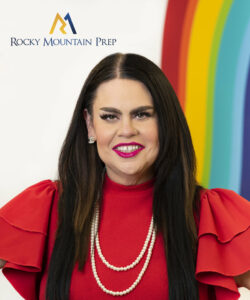
Blueprint’s Charter School Research Collaborative Advisory Council is a group of leading charter school policymakers, practitioners, and researchers who provide valuable insight and support to the Collaborative. In this post, Advisory Council member Tricia Noyola shares about her background, her current role as CEO of Rocky Mountain Prep, her experience with research, and more.
When Tricia Noyola was a child growing up in rural Texas, educational choice wasn’t much of an option. She attended public school in the Rio Grande Valley, at the southernmost tip of Texas. Given the lack of choice she faced growing up, Noyola says, “I decided that I wanted to commit my life to providing opportunities for all kids to design a life that they love.”
Throughout her career, Noyola has worked to improve opportunities for children of all backgrounds. She began working in education as a middle school teacher, a job that she loved. Following that experience, she worked in various administrative roles at IDEA Public Schools, a charter management organization (CMO) that serves students throughout the southern U.S., including in the Rio Grande Valley, where Noyola grew up.
“IDEA Public Schools… was the first charter school in the Valley,” she states. “That genesis fundamentally changed education for everyone in the Valley.” IDEA schools emphasized college readiness (for example, through AP courses and SAT preparation)—something Noyola hadn’t experienced growing up. Working at IDEA, Noyola advocated for college readiness and educational choice throughout rural and urban communities. As an Executive Director, she led the expansion of the CMO in Austin, Texas. Her work in the Valley has stuck with her, though. “Our rural communities are often overlooked,” she notes, “but they’re oftentimes the unsung heroes of this movement, because they’re doing it without a lot of fanfare… but truly achieving incredible results.”
Working with rural communities has helped Noyola see possibility everywhere. She maintains this outlook in her current role as CEO of Rocky Mountain Prep, a CMO that includes five elementary schools, five middle schools, and two high schools in the Denver area. Noyola explains that while she loved her role at IDEA, she chose to work as CEO of Rocky Mountain Prep “to be more involved in creating a model of [her] choosing.”
Rocky Mountain Prep’s model includes initiatives such as the Reading Academy, which provides a vision for literacy in secondary schools and incorporates an intentional, explicit reading instructional block that serves middle and high school students who need basic reading instruction. Their vision also includes training every staff member and student in the science of reading, offering after-school independent reading time, and partnering with families to provide tools for them to support students at home. Noyola feels passionate about addressing the adolescent literacy crisis and relies on research to guide her efforts.
“We’ve been shameless about not inserting our opinions but just going to what the research says is most effective,” Noyola says. Rocky Mountain Prep currently partners with Stanford researchers to examine the outcomes of the Reading Academy. Noyola hopes they can use this work to scale up the effective components of the program and provide a foundation for other schools to build upon.
Rocky Mountain Prep’s research is part of a long tradition of charter school innovation and research. “Charter schools have always played a really special role in research,” Noyola says. She hopes that charters nationwide will continue this work. “I want us, as a charter community, to return back to… that innovation [and] to ask… the harder questions.”
Ultimately, Noyola aims to create an environment in Rocky Mountain Prep schools built on “rigor and love.” The work may not be easy, but it makes Noyola feel hopeful. She notes that in a time when there’s not a lot of optimism about education, especially at the national level, “I feel a ton of optimism, and I feel a ton of urgency, because the problems haven’t gotten easier—they’ve gotten more challenging—but I still deeply believe in the promise and potential of all kids and all families, and I see it every day.”
Interested in learning more about the Charter School Research Collaborative? Visit our website.